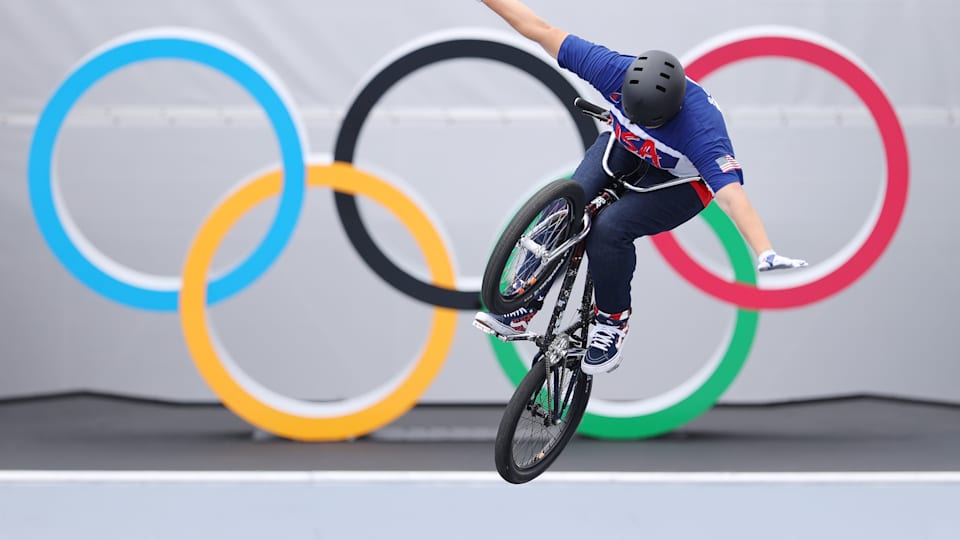
Like so many Olympic disciplines which involves subjective judging, an age-old question pops up around the new, urban sports featuring at the Olympic Qualifier Series (OQS), including BMX freestyle cycling.
"Is this a sport or art?"
Unsurprisingly, there are a range of responses and views. Some practitioners of urban sports, including in BMX freestyle, feel that leaning too much into an organised sport loses the original spirit of the discipline.
Yet others feel it is inevitable that, as more competitions and widespread media coverage follow, BMX freestyle becomes increasingly more sport than art.
Ahead of BMX freestyle's appearance at the inaugural OQS, which you can watch live on Olympics.com and the official Olympics mobile app, we look at the arguments as to whether BMX freestyle is sport or art, with help from various top riders sharing their opinions.
The arguments for BMX Freestyle being sport
A number of the world's best recognise that it is hard to separate the two: BMX freestyle clearly has elements of being both sport and art. But there are some obvious reasons as to why it might be considered a sport first.
Two-time Australian national champion and OQS competitor Sarah Nicki says, "I like to say like it's a sport [in that] it's intense, you have to do obviously heaps of physical training, activity.
"And even out there for a whole minute on the course in practice, it's very intense."
Tokyo 2020 Olympian and Paris hopeful Nick Bruce points out he doesn't go into competitions with anything other than full focus on doing his best to win.
"What I truly love about competing is it's hard for me to watch my competitors because I'm so focused on what I'm planning to do.
"So in that area, I'm like, okay, that's a sport."
Frenchman Anthony Jeanjean finished seventh in BMX freestyle's Olympic debut at Tokyo. He says that to receive coverage of his achievements, he had to deliver results and prove to people that "BMX (freestyle) was an athlete's sport".
"I had to prove that it was possible to achieve results; I had to go get them," he insisted. "So it's really not simple, but it is becoming more and more known (as a sport)."
Tokyo 2020 silver medallist Hannah Roberts is in the 'both sport and art' camp but leans toward BMX freestyle being a sport due to the judging element. Interestingly, that point is also used by those who see it as an art form.
"When you bring in the contest aspect and the judges and all that stuff, it's definitely a sport in that aspect," she says. "When you bring in the judges, it's a sport."
BMX Freestyle as an art form
That point of judging – something subjective in BMX freestyle, where it comes down to how each judge feels about an unscripted run with no set points for each move – is what makes BMX freestyle more of an art, according to USA coach and multiple-time X Games champ Ryan Nyquist.
Speaking before BMX freestyle's Olympic debut in Tokyo, he told Olympics.com: "We don't have prerequisite tricks or even a standardised score for certain tricks. Our event is kind of based on… they call it 'overall impressions'.
"It's called 'freestyle' for a reason because you get 60 seconds and it's similar to an artist, it's just your palette. You can create in that, paint on that canvas whichever way you want, and then you show [the judges] your artwork, and you're like 'Do you like it?'
"And then they go: 'We really like it! We're going to give you a 99!' That's what you hope for."
And while Bruce says being competitive lends itself more to sport, he still sees BMX freestyle more as an art for the judging aspect.
"What everyone seems to be worried about with our sport becoming an Olympic sport (is) that it might be too rigid or robotic. I really think BMX works itself out because even if it is points driven per trick, it's going to bring more exciting tricks.
"So it's like, 'Oh, this is only worth X amount of points.' But to beat that you're going to have to do an even harder trick that no one even knows how to score, but it's just spectacular enough to make you go, 'What the heck?' That's what makes the art again."
Roberts adds: "I definitely think when it comes to just having fun, it's definitely an art form, where you can make whatever you want to make."
Nicki, too, agrees that developing a run to thrill the judges lends itself to the art argument. "Planning our runs, it's also kind of like an artwork. It's performing to the judges," she says.
"You have your minute and you have to really plan it out, where you're going to do your big tricks, where are you going to do your smaller tricks to fill the run out, where am I going next in the course."
The magic of BMX freestyle
Ultimately, the beauty of BMX freestyle lies in the fact that it straddles both sport and art, not quite well-defined as either but still comfortable to call itself both.
As Roberts, who will also compete at OQS to try to obtain a Paris 2024 qualifying quota, points out, "There's some riders that just don't care to ride contests, that's just not their thing. And that's totally okay. And they bring such a cool outlook on riding and they have such a unique style.
"If you go and watch (Olympic champion) Logan Martin ride and then you watch Dennis Enarson ride, they're two amazing athletes; they're two of the best that have ever touched a bike. But they have two completely unique styles.
"And it goes the same for everybody. Everybody's got some kind of touch that's their own. And that's why I've always loved BMX."
The BMX freestyle community, like in many urban sports, supports each other and is genuinely happy when a fellow competitor or friend nails a trick.
"Because there's no step-by-step process of what makes a winning run, it's more of the magic behind it," Bruce says. "For a lack of a better term, there's some sort of magic behind of how someone puts these certain tricks in a certain order, or the timing of it at the end of the run or beginning or middle. It all adds up to one spectacular performance.
"And that's what moves people or that's what moves me like, man, that's exciting. Just knowing how difficult these things are to perform, and I'm just watching my friends get to do that, or myself getting to be a part of that.
"I think that's so special."

